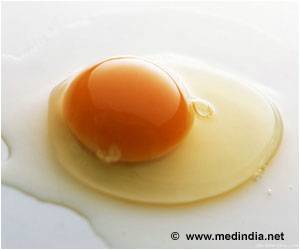Growing children should eat eggs, as they are an important source of proteins and calcium. Unfortunately, egg protein is one of the commonest causes of allergy among children.

Egg is widely used in baked goods, sauce, spaghetti, candies, meatloaf, noodle soups, mayonnaise, processed meats, etc. The best advice for people allergic to eggs is to read all labels for foods, medicines, cosmetics, creams and ointments that may contain any type or amount of egg.
Wesley Burks and colleagues had conducted a trial that was published in New England Journal of Medicine, 2012, to assess the role of oral immunotherapy in benefitting young children with egg allergy.
The trial was conducted by the National Institute of Allergy and Infectious Diseases (NIAID)-supported Consortium of Food Allergy Research (CoFAR) at clinical sites in Baltimore, Chapel Hill, N.C., Denver, Little Rock, Ark., and New York City.
The researchers conducted a study involving 55 children with egg allergy. The children were aged between 5 to 11 years. Out of 55 children, 40 of them were given egg-white powder as oral immunotherapy and 15 children were given cornstarch powder for 14 months. The children then took part in a food challenge where they consumed increasing quantities of allergenic food under proper medical supervision. The food challenge test helps in assessing at what level the person experiences adverse allergic symptoms.
Scott Sicherer, MD, Professor of Pediatrics and Chief of the Division of Allergy and Immunology at Mount Sinai School of Medicine said, "After 10 months of therapy, 55 percent of those who received oral immunotherapy passed the oral food challenge and were considered to be desensitized, compared to none of those on placebo."
About 28 percent of children in the oral-immunotherapy successfully passed the food challenge at 24 months. No longer did they have any egg allergy.
He added, "It represents a promising therapeutic intervention for food allergy and the approach is relatively safe, with most of the reactions to dosing categorized as mild."
It was noted that due to significant clinical reactions around 15 percent of children receiving oral immunotherapy did not take the entire therapy.
Dr. Sampson stated, "For oral immunotherapy to be recommended as a standard of care, it will be important to better define the risks of oral immunotherapy versus avoiding the food the child is allergic to, and determine the correct dosing regimens with the most favorable outcomes."
The researchers said that it was essential to identify the patients who are likely to be benefitted from the oral immunotherapy, and formulate policies and strategies for promoting long-term tolerance.
It was thus concluded that oral immunotherapy resulted in providing safety and protection to children against egg allergy by raising reaction threshold.
Reference:
Oral Immunotherapy for Treatment of Egg Allergy in Children; Wesley Burks et al; N Engl J Med 2012; 367:233-243
Source-Medindia
 MEDINDIA
MEDINDIA




 Email
Email










